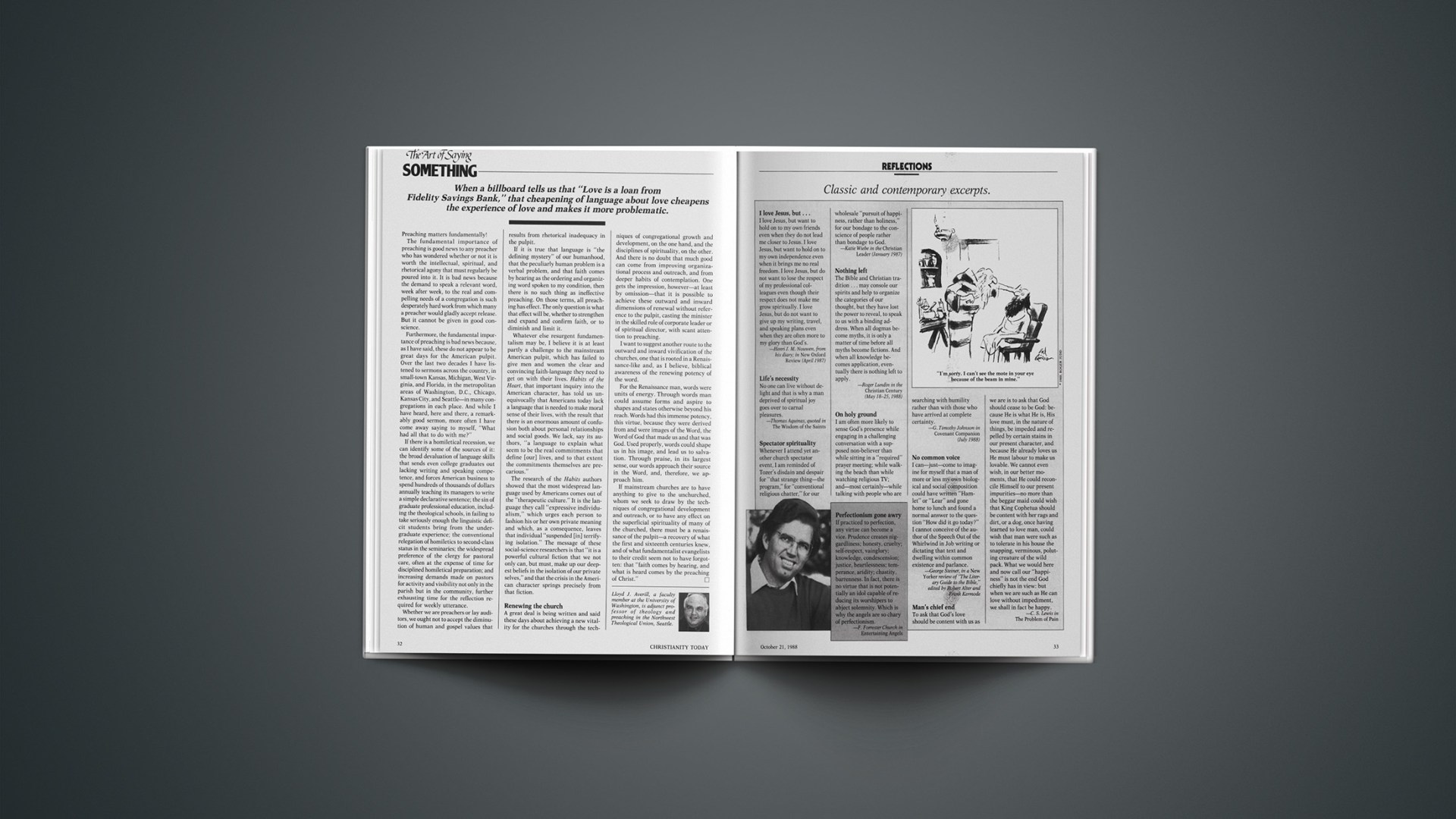Classic and contemporary excerpts.
I love Jesus, but …
I love Jesus, but want to hold on to my own friends even when they do not lead me closer to Jesus. I love Jesus, but want to hold on to my own independence even when it brings me no real freedom. I love Jesus, but do not want to lose the respect of my professional colleagues even though their respect does not make me grow spiritually. I love Jesus, but do not want to give up my writing, travel, and speaking plans even when they are often more to my glory than God’s.
—Henri J. M. Nouwen, from his diary; in New Oxford Review (April 1987)
Life’s necessity
No one can live without delight and that is why a man deprived of spiritual joy goes over to carnal pleasures.
—Thomas Aquinas, quoted in The Wisdom of the Saints
Spectator spirituality
Whenever I attend yet another church spectator event, I am reminded of Tozer’s disdain and despair for “that strange thing—the program,” for “conventional religious chatter,” for our wholesale “pursuit of happiness, rather than holiness,” for our bondage to the conscience of people rather than bondage to God.
—Katie Wiebe in the Christian Leader (January 1987)
Nothing left
The Bible and Christian tradition … may console our spirits and help to organize the categories of our thought, but they have lost the power to reveal, to speak to us with a binding address. When all dogmas become myths, it is only a matter of time before all myths become fictions. And when all knowledge becomes application, eventually there is nothing left to apply.
—Roger Lundin in the Christian Century (May 18–25, 1988)
On holy ground
I am often more likely to sense God’s presence while engaging in a challenging conversation with a supposed non-believer than while sitting in a “required” prayer meeting; while walking the beach than while watching religious TV; and—most certainly—while talking with people who are searching with humility rather than with those who have arrived at complete certainty.
—G. Timothy Johnson in Covenant Companion (July 1988)
Perfectionism gone awry
If practiced to perfection, any virtue can become a vice. Prudence creates niggardliness; honesty, cruelty; self-respect, vainglory; knowledge, condescension; justice, heartlessness; temperance, aridity; chastity, barrenness. In fact, there is no virtue that is not potentially an idol capable of reducing its worshipers to abject solemnity. Which is why the angels are so chary of perfectionism.
—F. Forrester Church in Entertaining Angels
No common voice
I can—just—come to imagine for myself that a man of more or less my own biological and social composition could have written “Hamlet” or “Lear” and gone home to lunch and found a normal answer to the question “How did it go today?” I cannot conceive of the author of the Speech Out of the Whirlwind in Job writing or dictating that text and dwelling within common existence and parlance.
—George Steiner, in a New Yorker review of “The Literary Guide to the Bible,” edited by Robert Alter and Frank Kermode
Man’s chief end
To ask that God’s love should be content with us as we are is to ask that God should cease to be God: because He is what He is, His love must, in the nature of things, be impeded and repelled by certain stains in our present character, and because He already loves us He must labour to make us lovable. We cannot even wish, in our better moments, that He could reconcile Himself to our present impurities—no more than the beggar maid could wish that King Cophetua should be content with her rags and dirt, or a dog, once having learned to love man, could wish that man were such as to tolerate in his house the snapping, verminous, poluting creature of the wild pack. What we would here and now call our “happiness” is not the end God chiefly has in view: but when we are such as He can love without impediment, we shall in fact be happy.
—C. S. Lewis in The Problem of Pain










